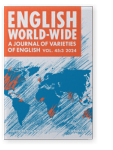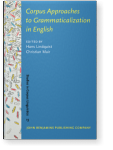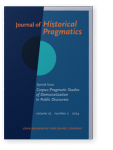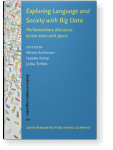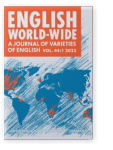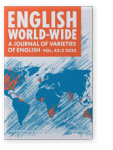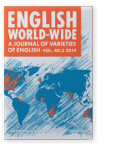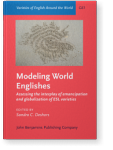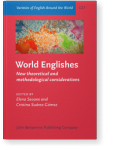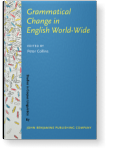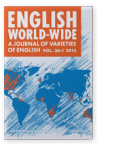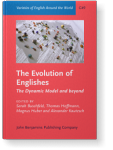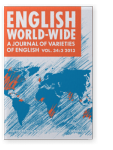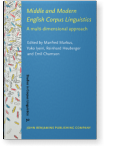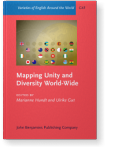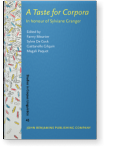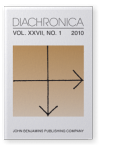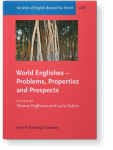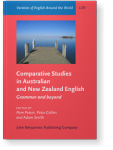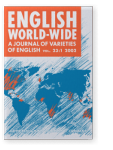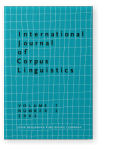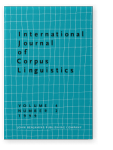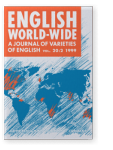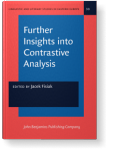Christian Mair
List of John Benjamins publications for which Christian Mair plays a role.
Journal
Title
Corpus Approaches to Grammaticalization in English
Edited by Hans Lindquist and Christian Mair
[Studies in Corpus Linguistics, 13] 2004. xiv, 264 pp.
Subjects Corpus linguistics | English linguistics | Germanic linguistics | Historical linguistics
2024 Colloquialisation: Twenty-five years on Corpus-Pragmatic Studies of Democratization in Public Discourses: New perspectives, methods and materials, Hiltunen, Turo, Turo Vartiainen and Jenni Räikkönen (eds.), pp. 193–214 | Article
Surveying a representative sample of studies of colloquialisation, a tendency for written norms to move closer to spoken usage, the chapter explores: the relationship between colloquialisation, operationalised in exclusively linguistic terms, and informalisation and democratisation, two… read more
2023 Chapter 4. Empire, migration and race in the British parliament (1803–2005) Exploring Language and Society with Big Data: Parliamentary discourse across time and space, Korhonen, Minna, Haidee Kotze and Jukka Tyrkkö (eds.), pp. 118–141 | Chapter
The chapter studies the intertwined topics of Empire, migration and race in the Hansard Corpus (1803–2005). The British Empire emerges as a prominent topic from the mid-nineteenth century, but rapidly recedes into insignificance in the two decades following World War II. Emigration dominates in… read more
2023 Nigerian English as a Lingua Franca: Intelligibility and attitudes in German-speaking contexts English World-Wide 44:1, pp. 34–60 | Article
This paper investigates the use of Nigerian English in lingua-franca interaction in Germany, focussing on the perspective of the German listener. Fifty-eight German-speaking respondents were asked to transcribe short extracts from English interviews recorded with Nigerian immigrants and… read more
2019 John H. McWhorter. 2018. The Creole Debate English World-Wide 40:3, pp. 349–355 | Review
2018 Stabilising domains of English-language use in Germany: Global English in a non-colonial languagescape Modeling World Englishes: Assessing the interplay of emancipation and globalization of ESL varieties, Deshors, Sandra C. (ed.), pp. 45–76 | Chapter
The growing impact of English in Germany since World War II has largely been dealt with in terms of lexical borrowing. In contrast to this, the present contribution will focus on emerging domains of regular use of English, be it as a lingua franca or as part of multilingual repertoires. Two of… read more
2016 Englishes beyond and between the three circles: World Englishes research in the age of globalization World Englishes: New theoretical and methodological considerations, Seoane, Elena and Cristina Suárez-Gómez (eds.), pp. 17–36 | Article
The study of “varieties of English around the world”, the “New Englishes” or “World Englishes” emerged at the intersection of dialectology, sociolinguistics and historical linguistics in the early 1980s and has become one of the most vibrant sub-fields of English linguistics. Work in this tradition… read more
2015 Cross-variety diachronic drifts and ephemeral regional contrasts: An analysis of modality in the extended Brown family of corpora and what it can tell us about the New Englishes Grammatical Change in English World-Wide, Collins, Peter (ed.), pp. 119–146 | Article
The present study offers the first analysis of modals and semi-modals which is based on all six completed Brown family corpora (B-Brown, B-LOB, Brown, LOB, Frown, F-LOB) and shows that the dynamics of diachronic change have prevented the emergence and preservation of stable regional contrasts… read more
2015 Response to Davies and Fuchs English World-Wide 36:1, pp. 29–33 | Commentary
Commentary to: Davies, Mark, and Robert Fuchs. 2015. "Expanding horizons in the study of World Englishes with the 1.9 billion word Global Web-based English Corpus (GloWbE)". English World-Wide 36:1–28 (This issue). DOI:10.1075/eww.36.1.01dav
read more2014 Does money talk, and do languages have price tags? Economic perspectives on English as a global language The Evolution of Englishes: The Dynamic Model and beyond, Buschfeld, Sarah, Thomas Hoffmann, Magnus Huber and Alexander Kautzsch (eds.), pp. 249–266 | Article
The rise of English to its present position of the world’s undisputed lingua franca and the role of Global English in a multilingual world are core topics of World Englishes research. However, this does not mean that they have not been of interest to researchers in other disciplines, as well – for… read more
2013 The World System of Englishes: Accounting for the transnational importance of mobile and mediated vernaculars English World-Wide 34:3, pp. 253–278 | Article
Contact between and mutual influences among varieties of standard and non-standard English have always been a central concern in research on World Englishes. In a mobile and globalising world such contacts are by no means restricted to diffusion of features in face-to-face interaction, across… read more
2012 ... ging uns der ganze alte Dialektbegriff in eine Illusion auf: The deterritorialization of dialects in the 20th and 21st centuries Middle and Modern English Corpus Linguistics: A multi-dimensional approach, Markus, Manfred, Yoko Iyeiri, Reinhard Heuberger and Emil Chamson (eds.), pp. 269–284 | Article
Referring to the work of the Innsbruck-born and Berlin-based dialectologist Alois Brandl (1855–1940), the paper shows how the opportunities provided by early recording technology made linguists question the notion of dialect as a stable, regionally defined variety of a language. It goes on to argue… read more
2012 Change from to-infinitive to bare infinitive in specificational cleft sentences: Data from World Englishes Mapping Unity and Diversity World-Wide: Corpus-Based Studies of New Englishes, Hundt, Marianne and Ulrike Gut (eds.), pp. 243–262 | Article
We investigate variable usage in specificational cleft sentences of the types All I did was help / to help / I helped him find a new job. Previous research identified a drift away from the marked and towards the unmarked infinitive in British and American English in the twentieth century. Spoken… read more
2011 Corpora and the new Englishes: Using the ‘Corpus of Cyber-Jamaican’ to explore research perspectives for the future A Taste for Corpora: In honour of Sylviane Granger, Meunier, Fanny, Sylvie De Cock, Gaëtanelle Gilquin and Magali Paquot (eds.), pp. 209–236 | Article
Contrasts between British and American usage were an important topic in computer-aided corpus linguistics from the very start. The present contribution shows how from these beginnings the scope of corpus-based research was successively extended to cover standard varieties of the New Englishes (e.g.… read more
2010 Review of Schreier (2008): St. Helenian English: Origins, evolution and variation Diachronica 27:1, pp. 166–169 | Review
2009 Corpus linguistics meets sociolinguistics: Studying educated spoken usage in Jamaica on the basis of the International Corpus of English World Englishes – Problems, Properties and Prospects: Selected papers from the 13th IAWE conference, Hoffmann, Thomas and Lucia Siebers (eds.), pp. 39–60 | Article
The contribution is a plea for closer co-operation between sociolinguistics and corpus linguistics in the study of World Englishes, supporting the case with the author’s own findings from the recently completed Jamaican component of the International Corpus of English (ICE-JA). The variables… read more
2009 Infinitival and gerundial complements Comparative Studies in Australian and New Zealand English: Grammar and beyond, Peters, Pam, Peter Collins and Adam Smith (eds.), pp. 263–276 | Article
The present contribution investigates three patterns of non-finite clausal complementation which are known to be variable in contemporary British and American English, namely the use of bare and to-infinitives with help, the presence or absence of from before gerunds following the verb prevent, and… read more
2004 Introduction Corpus Approaches to Grammaticalization in English, Lindquist, Hans and Christian Mair (eds.), pp. ix–xiv | Miscellaneous
2004 Corpus linguistics and grammaticalisation theory: Statistics, frequencies, and beyond Corpus Approaches to Grammaticalization in English, Lindquist, Hans and Christian Mair (eds.), pp. 121–150 | Article
The paper argues for a closer collaboration between corpus linguists and grammaticalisation theorists. Corpora have a number of benefits: First, they make it possible to study incipient or ongoing processes of grammaticalisation. Secondly, a quantitative-cum-qualitative analysis of corpus data… read more
2002 Creolisms in an emerging standard: Written English in Jamaica English World-Wide 23:1, pp. 31–58 | Article
After showing that standardisation processes in spoken and written usage in Jamaica must be seen as distinct from each other, the paper focuses on the role of the creole substrate in the formation of the emergent written standard in Jamaica. The approach is corpus-based, using material from the… read more
2002 Short term diachronic shifts in part-of-speech frequencies: A comparison of the tagged LOB and F-LOB corpora International Journal of Corpus Linguistics 7:2, pp. 245–264 | Article
The paper presents a comparison of tag frequencies in two matching one-million word reference corpora of British standard English, the 1961 LOB-corpus and its 1991 “clone” produced at Freiburg. Both corpora were tagged using a version of the CLAWS part-of-speech-tagger developed at Lancaster, and… read more
1999 "Agile" and "Uptight" Genres: The Corpus-based Approach to Language Change in Progress International Journal of Corpus Linguistics 4:2, pp. 221–242 | Article
This paper is a follow-up study to previous investigations based on the analysis of parallel British and American corpora from the early 1960s and 1990s. It focuses on variables that are suspected to contribute to the growing "colloquicdisation " of the norms of written English, that is, a… read more
1999 Review of Görlach (1998): Even More Englishes: Studies 1996–1997 English World-Wide 20:2, pp. 339–341 | Review
1991 Presuppositions in English and German subject clauses Further Insights into Contrastive Analysis, Fisiak, Jacek (ed.), pp. 527–538 | Article
